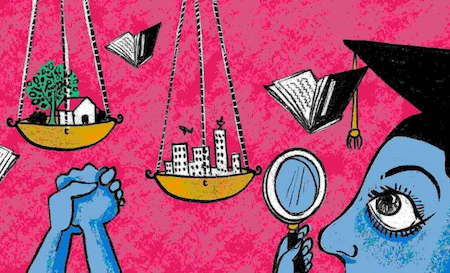For a US student, working among tribal populations, Naxalites and wild elephants in India was unthinkable, but Ryan Ballard wants it all and is back in the country working with Magic Bus, a non governmental organisation. The 25-year-old studied anthropology and global poverty at the University of California at Berkeley, US. […]
“Coming face to face with serious structural, social and cultural circumstances that impede progress showed me the realities and challenges of development work. Since health was my subject, my internship at Jharkhand reified that people here need basic health care and food security”, says Ballard. […]
“For two months I stayed in Jamshedpur working under project leader, P.C. Mahapatra, Head of Tata Steel Family Initiatives Foundation. My projects ranged from adolescent sexual health to maternal to child health and family planning services. Through qualitative assessment, background research and session observations, I was able to use my holistic research skills from my anthropology background to understand the array of services offered, their effectiveness and appropriateness given the populations that they served,” he said.
Appalled at the lack of infrastructure affecting day-to-day life for most of the poor in Jharkhand and the withdrawal of the Government from the social welfare of the people, Ballard decided to tackle what he terms, “the feminisation of poverty.”
“Women are disproportionately affected by social issues. They (women) are supposed to be agents of change and have a pivotal and important role to play in society. The scene is very different here, where women are statistically affected from poverty, more so than men,” he said, adding, “The exposure fuelled my interest to work in the realm of poverty alleviation, in India.”
After finishing his internship, Ballard returned to the US to finish his degree. “Promptly afterwards, I applied for and was chosen as a 2011-12 American India Foundation (AIF) William J Clinton Fellow for Service in India and was placed with Magic Bus in Mumbai. I aim to help develop curriculum for their Peer Leader Programme, which teaches underprivileged children important topics relating to health, gender, leadership, education and livelihood through sports,” he said.
Ryan’s two-month experiential internship at the ongoing corporate sustainability projects of the Tata group companies is to be echoed by 18 international students this year. […]
These students will form the 5th edition of the Tata ISES, started in 2008. “The programme is designed with a vision to provide grass-roots level exposure in India while bringing an international perspective to the company projects. In the Tata ISES initiative, the list of identified projects is shared with the Universities who announce this on campus inviting applications,” said a company spokesperson. […]
Ballard added, “I wanted to come back to India and work with these communities since I understand the context of development in India a little better. My internship has grounded me. It also taught me immense patience – one can reason with Naxalites, but not wild elephants.”
Source: “Tata social scheme draws intern back to India” by Amrita Nair-Ghaswalla (The Hindu Business Line, 30 July 2012)
Address: https://www.thehindubusinessline.com/economy/tata-social-scheme-draws-intern-back-to-india/article23087445.ece
Date Visited: 1 October 2021
[Bold typeface added above for emphasis]
“Since the Indian Constitution uses the term ‘Scheduled Tribes’ or ‘tribals’ to refer to indigenous communities in India and the colloquial reference used by several indigenous communities themselves is ‘adivasis’ these two terms shall be used interchangeably.” – Rebecca S . David in “An analysis of the impact of the Forest Rights Act (2006) in three states of India” (MPhil University of Cambridge, UK, 2014), p. 1 | Learn more | Classifications in different states >>
“If women are empowered, there is more development in society” – Droupadi Murmu
Find this and other speeches by the 15th President of India >>

Tip: to find out more about this issue, type or copy “Women are more affected from poverty” in the search window seen below
Reports in the Indian press | List of periodicals included in this search >>
Search tips
Combine the name of any particular state, language or region with that of any tribal (Adivasi) community.
Add keywords of special interest (music, poetry, dance just as health, sacred grove and biodiversity); learn about the rights of Scheduled Tribes such as the “Forest Rights Act” (FRA); and the United Nations “Declaration on the Rights of Indigenous Peoples”, “Universal Declaration of Human Rights”, “women’s rights”, or “children’s right to education”.
Specify any other issue or news item you want to learn more about (biodiversity, bonded labour and human trafficking, climate change, ecology, economic development, ethnobotany, ethnomedicine, global warming, hunter-gatherers in a particular region or state, prevention of rural poverty, water access).
For official figures include “scheduled tribe ST” along with a union state or region: e.g. “Chhattisgarh ST community”, “Himalayan tribe”, “Scheduled tribe Tamil Nadu census”, “ST Kerala census”, “Particularly Vulnerable Tribal Group Jharkhand”, “PVTG Rajasthan”, “Adivasi ST Kerala”, “Adibasi ST West Bengal” etc.
In case the Google Custom Search window is not displayed here try the following: (1) toggle between “Reader” and regular viewing; (2) in your browser’s Security settings select “Enable JavaScript” | More tips >>
Note: hyperlinks and quotes are meant for fact-checking and information purposes only | Disclaimer >>
Tips | Interactive map
For details and hyperlinks, click on the button seen on the left top of this map.
Scroll and click on one of the markers for information of special interest.
Explore India’s tribal cultural heritage with another interactive map >>
Learn more
Bhasha | Free eBooks & Magazine: Adivasi literature and languages
Books on tribal culture and related resources
Childhood | Childrens rights: UNICEF India | Safe search
Daricha Foundation | Daricha YouTube channel
eBook | Background guide for education
The Food Book of four communities in the Nilgiri mountains: Gudalur Valley – Tamil Nadu
Misconceptions | “Casteism” and its effect on tribal communities
Multilingual education is a pillar of intergenerational learning – Unesco